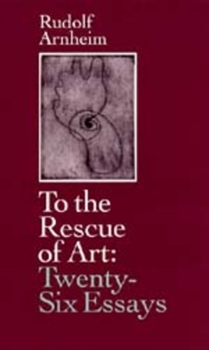To the Rescue of Art: Twenty-Six Essays
Select Format
Select Condition 
Book Overview
Never before published essays by the widely admired psychologist of art. Arnheim spiritedly asserts art's fundamental achievements. Rudolf Arnheim has spent a lifetime analyzing the basic psychological principles that make works of visual art meaningful, stirring, indispensable, and lasting. But recent fashionable attitudes and theories about art, he argues, are undermining the foundation of artistic achievement itself. The essays collected in this volume are written in his familiar, careful, and solidly supported manner, but under present circumstances they amount to a call to arms. Included is a series of miniature monographs on a variety of great works of art. In other essays, Arnheim uncovers enlightening perspectives in the art of the blind, in architectural space, in caricature, and in the work of psychotics and autistic children. He also presents new scientific aspects on the psychology of art and widens our range of vision by connecting art with language, literature, and religion.
Format:Paperback
Language:English
ISBN:0520074599
ISBN13:9780520074590
Release Date:November 1991
Publisher:University of California Press
Length:243 Pages
Weight:0.10 lbs.
Dimensions:0.7" x 6.0" x 9.0"
Customer Reviews
1 rating
Aesthetics of Art
Published by Thriftbooks.com User , 25 years ago
With this essays in this book, Arnheim discusses art as art, or rather what makes art. One of his theses is that much of the blame for the current decline of art and of art and literary criticism lies with the fin de siecle mood of the general culture, but much of it lies with those who are supposed to be critics. Many critics, and unfortunately teachers, subscribe to the belief that the criteria by which a work of art deserves to be held in aesthetic and social esteem no longer exist. Thus, one can hardly blame people for arguing that art is anything they chooses to call it if the very people who are supposed to supply the standards by which to judge what is and is not art assert that any kind of objective criteria no longer exist. On the other hand, artists are always exploring and innovating. But exactly for this reason, critics should discuss what makes art art. It is too easy to indulge in the easy pleasures of relativism just as it is too easy to answer with smug, superior expressions when people ask what is meant by art. The solution to rescuing the arts consists in discrimination, once the penultimate critical faculty, in pointing out the common core of sensory expression in all its manifestations-what William James calls the "sifting of human creations." What critics need to do is revive and explore the principles of which all productive functioning of the arts is based. As Arnheim states: "If art is indispensable as a psychological, and possibly a biological, requirement of existence, it must be assumed to grow from the very depths of our being. And if so, these roots must be traceable. Therefore, critics must be heralds of the principles they are retrieving." But, do not be put off by the political nature of this review. Arnheim is not a polemicist. The majority of the book is devoted to what he states critics need do: discuss art as art, not art as politics. And he does that very well.





